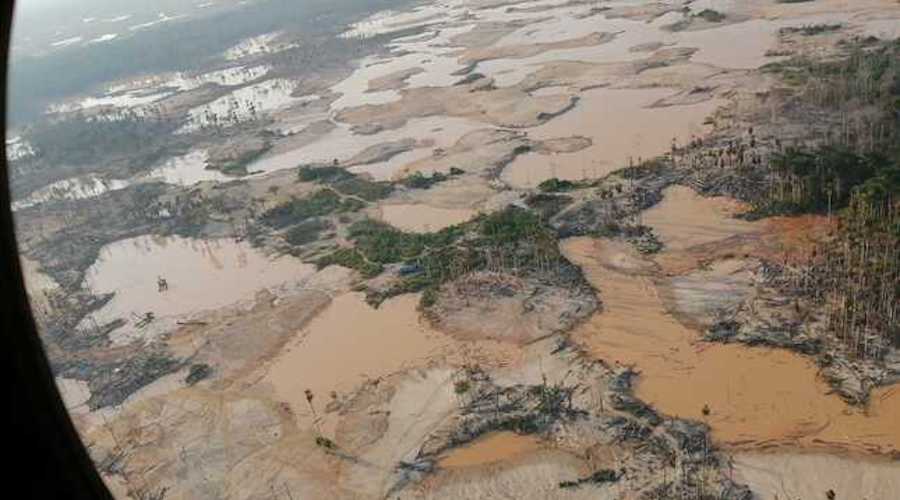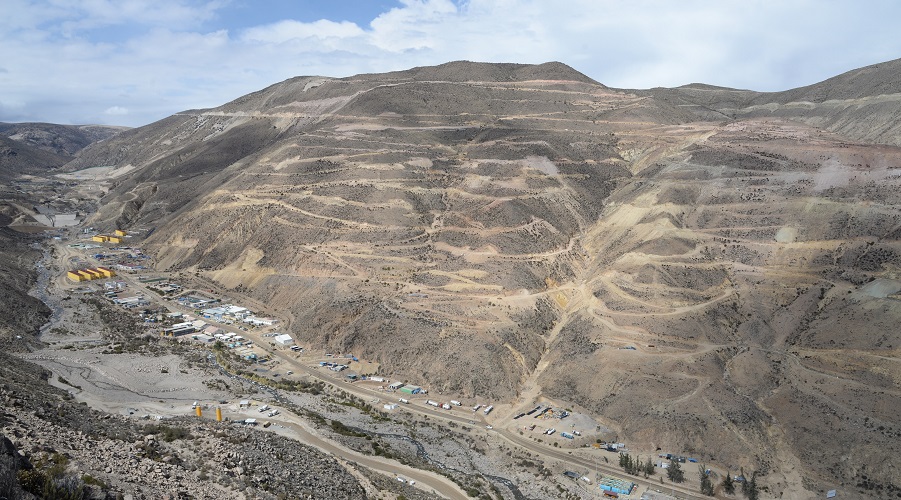Valentina Ruiz Leotaud | August 28, 2022 |

Devastation caused by illegal gold mining operations in Madre de Dios. (Image by Peru’s Interior Ministry).
Peru’s National Police seized and destroyed half a million dollars worth of equipment and supplies used in illegal mining operations in the Madre de Dios region.

According to the Interior Ministry, the police operation was carried out at the Buffer Zone of the Tambopata National Reserve, specifically in the “Barrial”, “Mangote” and “La Y” sectors which are known for hosting unregulated activities.
A recent report by USAID revealed that over 46,000 artisanal miners are extracting minerals illegally in Madre de Dios, located in southeastern Peru’s Amazon Basin, bordering Brazil and Bolivia. Of those, over 9,000 conduct their activities in protected areas.
Overall, it is estimated that as of 2017, illegal gold mining in the region has been responsible for the deforestation of more than 100,000 hectares of the Peruvian Amazon.
In the recent operation, police agents found and destroyed rafts, hoppers and engines commonly employed to extract gold using techniques that are harmful to the environment.
Following the operation, hundreds of people likely to be engaged in illegal mining held protests on the Interoceanic Highway and attacked the police base located in the community of Nuevo Arequipa. As a result of these incidents, one person died and eight demonstrators were arrested.
A few days after these events, the National Police Command sent 45 troops from Lima’s Directorate of Special Operations. Another, 20 law enforcement officers from Arequipa arrived at each police facility located at kilometres 98 and 117 of the Interoceanic highway.
In this regard, the director of the Environment Directorate, Colonel Luis Guillén Polo, said that, despite the resistance from illegal miners, the authorities will continue to work and carry out joint operations against the unregulated exploitation of Madre de Dios’ natural resources.
Peru lowers 2022 growth forecast and abandons mining tax hike plan
Reuters | August 25, 2022 |

Quellaveco mining camp. Photo by Anglo American Peru.
Peru on Thursday lowered the country’s economic growth forecast to 3.3% this year, the finance minister said, and officially abandoned a plan to hike taxes on the mining industry amid falling metal prices, high inflation and slowing growth.

The new forecast is significantly higher than the Refinitiv average of 2.6% but is lower than the 3.6% the ministry had last forecast in May.
Finance minister Kurt Burneo said the government would soon launch a package to boost the economy, although he declined to give details.
“The economy is growing at lower levels than what we need,” Burneo told reporters. “If we don’t do anything, we will only aspire to low growth levels.”
Still, the downward revision came on the back of “transitory supply shocks” that affected the primary sector in the first half of the year, including social unrest against the mining sector, and less favorable external conditions, the ministry said in a report.
Peru, the world’s No. 2 copper producer, is also expecting prices of the red metal to fall in 2023. It plans for higher production to offset the fall in tax revenue.
Leftist President Pedro Castillo came to office a year ago promising to hike taxes on the mining industry to fund social programs, although Congress shelved the initiative.
Burneo is the administration’s third finance minister and was appointed just three weeks ago. He said hiking mining taxes would amount to “shooting ourselves in the foot” but has insisted public spending needs to grow.
He added Peru’s budget should grow 4% in real terms in 2023.
For 2023, the Andean country forecasts growth of 3.5%, higher than the Refinitiv average of 2.8%, boosted by a larger mining supply and the normalization of economic activities hurt by the covid-19 pandemic.
Peru expects Anglo American’s Quellaveco copper mine to come online in 2023 and boost copper output that has fallen 10% so far this year due to community protests that affected two large mines owned by MMG Ltd and Southern Copper Corp.
Earlier this year, it also faced a wave of anti-government protests sparked by rising fuel and fertilizer prices in the wake of the Ukrainian war, while Castillo has reshuffled his cabinet several times as prosecutors investigate his close allies and family members.
The South American country has also been grappling with inflation, which reached the highest level in a quarter of a century in June.
(By Marco Aquino, Gabriel Araujo and Marcelo Rochabrun; Editing by Kim Coghill and Lisa Shumaker)
Reuters | August 25, 2022 |

Quellaveco mining camp. Photo by Anglo American Peru.
Peru on Thursday lowered the country’s economic growth forecast to 3.3% this year, the finance minister said, and officially abandoned a plan to hike taxes on the mining industry amid falling metal prices, high inflation and slowing growth.

The new forecast is significantly higher than the Refinitiv average of 2.6% but is lower than the 3.6% the ministry had last forecast in May.
Finance minister Kurt Burneo said the government would soon launch a package to boost the economy, although he declined to give details.
“The economy is growing at lower levels than what we need,” Burneo told reporters. “If we don’t do anything, we will only aspire to low growth levels.”
Still, the downward revision came on the back of “transitory supply shocks” that affected the primary sector in the first half of the year, including social unrest against the mining sector, and less favorable external conditions, the ministry said in a report.
Peru, the world’s No. 2 copper producer, is also expecting prices of the red metal to fall in 2023. It plans for higher production to offset the fall in tax revenue.
Leftist President Pedro Castillo came to office a year ago promising to hike taxes on the mining industry to fund social programs, although Congress shelved the initiative.
Burneo is the administration’s third finance minister and was appointed just three weeks ago. He said hiking mining taxes would amount to “shooting ourselves in the foot” but has insisted public spending needs to grow.
He added Peru’s budget should grow 4% in real terms in 2023.
For 2023, the Andean country forecasts growth of 3.5%, higher than the Refinitiv average of 2.8%, boosted by a larger mining supply and the normalization of economic activities hurt by the covid-19 pandemic.
Peru expects Anglo American’s Quellaveco copper mine to come online in 2023 and boost copper output that has fallen 10% so far this year due to community protests that affected two large mines owned by MMG Ltd and Southern Copper Corp.
Earlier this year, it also faced a wave of anti-government protests sparked by rising fuel and fertilizer prices in the wake of the Ukrainian war, while Castillo has reshuffled his cabinet several times as prosecutors investigate his close allies and family members.
The South American country has also been grappling with inflation, which reached the highest level in a quarter of a century in June.
(By Marco Aquino, Gabriel Araujo and Marcelo Rochabrun; Editing by Kim Coghill and Lisa Shumaker)
No comments:
Post a Comment